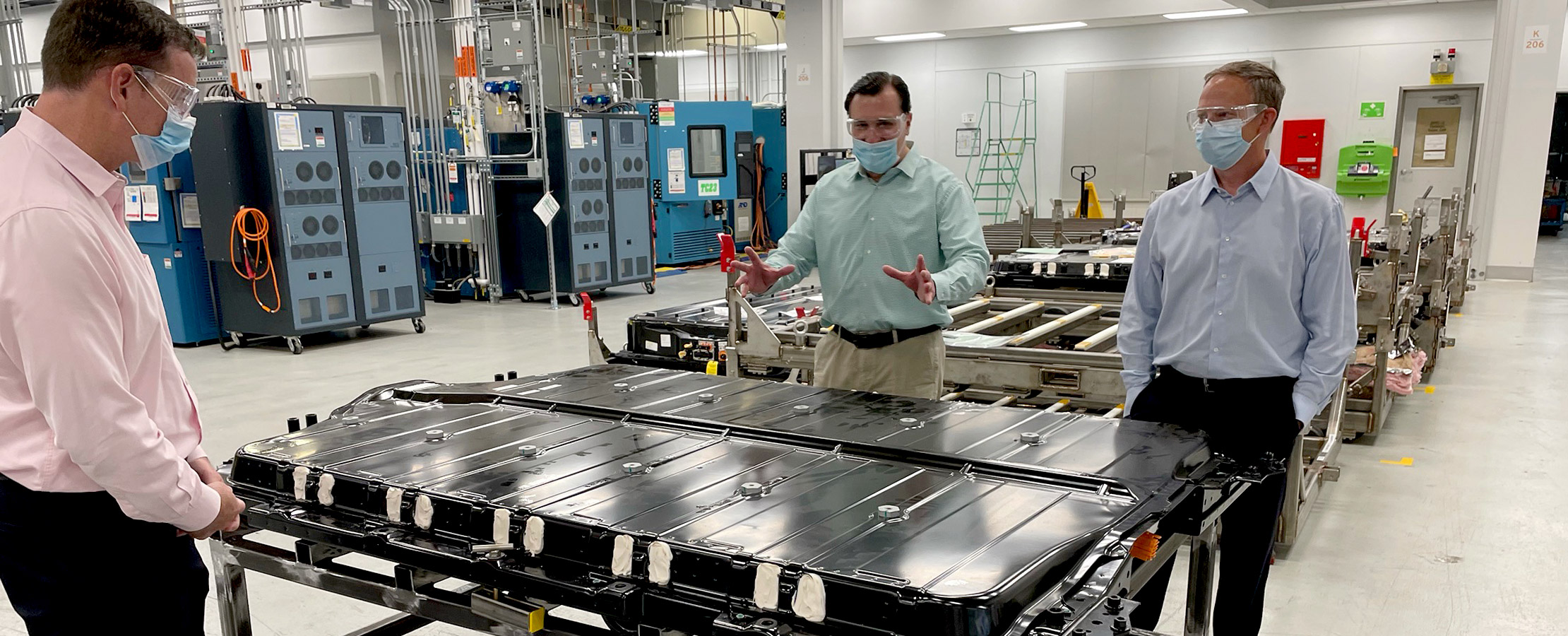Battery innovation is key to wider adoption of electric vehicles – IEF SG
Enhancing battery technology is key to wider adoption of electric vehicles (EVs), the Secretary General of the International Energy Forum said during a tour of General Motors’ technical center in the United States.
Globally, electric car sales grew 39 percent to about 3 million in 2020, an almost four-fold increase in just five years. However, this figure still represents only 4 percent of the global market.
"Continued innovation in battery technology is needed to realize the potential of electric vehicles," said Mr McMonigle on the tour of GM's Technical Center in Warren, Michigan.
The visit included a comprehensive tour of the company’s electric vehicle battery manufacturing facilities, domestic supply chain development, electric vehicle infrastructure and EV design.
Mr McMonigle visited GM’s state-of-the-art battery lab, where the company recently invested $1.5 billion to expand and enhance its testing lab and research and development facilities. He also received a behind-the-scenes look at GM’s proprietary Ultium battery, which will power its next generation of electric vehicles. The Ultium battery cells will be produced as part of a joint venture with LG Chem at a new facility in Ohio.
GM has reiterated its commitment to an all-electric future by confirming an investment of $20 billion in capital and engineering resources allocated to electric and autonomous vehicle programs between 2020 and 2025. Globally, it will produce 30 all-electric vehicles in all sizes, body styles and price points.
The IEF visit coincided with a speech by GM’s CEO Mary Barra, who said the success of EVs today and into the future would depend on the ability of automobile companies to make them both functional and affordable for consumers from all walks of life.
"The key to electric vehicles is battery cost," said Ms Barra, in an interview at the Aspen Ideas Festival. "How do we get energy density up and battery cost down so we can have a variety of solutions to serve everyone? … We have to have broad solutions to fit all the ways people or goods move to address climate change."

In January 2021, GM announced its plans to stop selling vehicles powered by gasoline or diesel by 2035. It also set a goal of carbon neutrality by 2040, with its plants and offices powered by renewable energy. "We’ve been working on electric vehicles for more than two decades," Ms Barra said. "As we look at climate change and looked at the science, we knew we had to take action."
"Three or four years ago we said, in order to really transition, we need to have an EV platform," she said, adding that GM will be rolling out the Ultium platform to the public market in fall 2021. The flexibility of the Ultium platform allows GM to build everything from a compact SUV to a Hummer.
Demand for EVs is expected to continue to rise, as many countries call for a transition from total reliance on internal combustion engines by 2030. China currently leads the world rankings for EV adoption. Some industry forecasts suggest EV sales will make up more than half of global sales in most vehicle segments by 2035.
Issues holding back wider adoption include uncertainty over the extent and duration of policy support from governments, charging and national electric grid infrastructure and the price of oil.
Ms Barra acknowledged that charge anxiety remains a significant concern for those who worry they'll end up stranded because they couldn''t find a charging station. "They need to have the confidence that if they need to go over 300 miles, there is a robust charging infrastructure," she said.
France, Japan, India, Norway and the United Kingdom have all committed to ending combustion-based vehicle engines, and automakers such as Bentley, Daimler, GM, Ford, Nissan, Volkswagen and Volvo have all set goals for EVs.
In considering the regulatory environment in the US, Ms Barra said she is hoping the government will adopt a national approach. "One of the things General Motors is working on is having a national zero-emissions vehicle program as opposed to a regulatory patchwork of state by state laws," she said.







